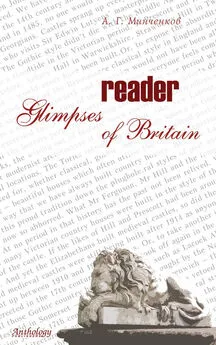Алексей Минченков - Glimpses of Britain. Reader
- Название:Glimpses of Britain. Reader
- Автор:
- Жанр:
- Издательство:Array Литагент «Антология»
- Год:2006
- Город:Санкт-Петербург
- ISBN:5-94962-113-1
- Рейтинг:
- Избранное:Добавить в избранное
-
Отзывы:
-
Ваша оценка:
Алексей Минченков - Glimpses of Britain. Reader краткое содержание
Glimpses of Britain. Reader - читать онлайн бесплатно ознакомительный отрывок
Интервал:
Закладка:
And still, he cannot believe his good fortune. “I survived the first war, then the influenza which killed even more people, then the second war. That’s why I trust in God.”
You won’t hear much grumbling from any of this lot. Whatever subsequent hardships life threw at them, they still see themselves as the Lottery winners of their generation.
“I reckon I’ve had this guardian angel sitting on my shoulder,” says Henry Allingham as he recalls his Great War, one which took him to the three most infamous battlegrounds of the lot.
As an air mechanic in HMS Kingfisher, he witnessed the great Battle of Jutland which effectively neutralised the German fleet – not that he sensed its significance at the time. “We didn’t do much. We just watched the shells ricochet.”
The First Mechanic and his squadron were then moved ashore to the Western Front – Ypres and the Somme – where one of his most vivid memories is of nearly drowning in a huge, festering shellhole filled with human remains, rats and mud.
“It was night. I couldn’t see and the sides were crumbling. I thought I’d drown, but I put my foot the right way and managed to drag myself out. But I couldn’t move until dawn because there might be booby-traps.”
In his darker moments, he can still see his pilots turn to “jelly” in the wreckage of their burning planes just yards in front of his position.
Nine decades on, the memory still brings back the tears. He prefers to dwell on the few happier moments of the war. “There was great camaraderie. You knew you could bank on the other bloke.”
And he is as modest as the next man. “It was those poor devils in the trenches, marching 20 miles with all their kit on a bowl of soup, it was them who won the war.”
One of those “poor devils” was Private Jack Oborne of the 52nd Devonshire Light Infantry, although, like all the rest, he sees himself as lucky. Certainly, if it wasn’t for the pocket watch which his father gave him in 1917, he wouldn’t be at the Cenotaph this morning.
He had already taken one bullet in the leg at Passchendaele – otherwise known as the Third Battle of Ypres – when a German bullet hit him in the chest. It hit the watch instead of Mr Oborne.
“He has never talked about it much,” says his son, David Oborne, 77. “If you’ve seen a shell throw up bodies blown up by a previous shell, you just try to block it out. I’ve tried to get things out of him but I can’t.”
All of these men – two of whom span three centuries – are still haunted by the events of 90 years ago. We may not share their ghosts. But we should never ignore their memories.
Why I’ll keep on riding to the rescue of Blenheim
By John Spencer Churchill,
11th Duke of Marlborough
The Mail on Sunday, August 8, 2004
Running a stately home today is very much a business – that’s the way it has to be. It has to be well thought-out, well organised and well run. It’s something we have developed over a period of time and will continue to do so.
The first paying visitors were admitted to the house in 1950. In those days, we opened only four days a week. Then I managed to persuade my father to open for five days a week. When I took over in 1972 I realised we had to be open seven days a week.
Recently we increased the number of days that we’re open by extending the season – this improves the bottom line. We have to open more days because the expenses are going up all the time. This year, for example, we’re staying open until December 12 – and will re-open next year in February.
It worries me slightly that we’re opening this long because the only way you can keep a house in good tip-top order is to close it down for a certain number of weeks so you can give it a proper spring clean. Maintenance is crucial because the future of the house is all-important.
Now it is in quite good order, something I can say with pride and satisfaction. But there is a lot of stone work that needs replacing and we also have to replace the six statues that used to be on the roof. We haven’t been able to do a lot of restoration over the past four years because all the monies have been drawn to rewiring, costing hundreds of thousands of pounds. If John Churchill were to return here today I think he would be delighted to see that the place is still in reasonably good nick. The other thing is that one has constantly got to think of other means of attracting outside events. It’s no use sitting back and thinking you can carry on the business in the same way that it was done 25 years ago. There’s a lot of outside competition now.
The one thing that has really hit the stately homes business quite badly is Sunday opening. There has been a huge change to the way of life in this country on Sundays. Fifteen to 20 years ago there was very little that people could do on Sundays except visit a stately home. The shops were shut, no race meetings took place. That’s all changed.
So we have to keep innovating. This year we have restored the Secret Garden, a treasure that has remained hidden for more than 30 years.
The garden was conceived by my father, the 10th Duke, and work began in 1960 on creating a romantic and secluded haven which broke away from the formal nature of traditional Victorian gardens.
My father was a keen gardener and planted unusual species of trees, shrubs and flowers to create a Four Seasons garden comprising winding paths, soothing water features, bridges, fountains, ponds and streams.
Over the past 30 years, the garden has grown wild and remained inaccessible to all but the most intrepid of explorers. However, a team of dedicated gardeners set about restoring it to its former glory.
We are constantly having to come up with things to make people aware that there is more to Blenheim than just the house.
At our music festival this year, for example, we had Barry Manilow performing on the final night. I’m a great Barry Manilow fan – he’s performed here before and I know him quite well.
You have to cater to all sections of the community, especially children, because they quite often tell the parents what they’ll be doing at weekends.
If anybody is interested in history or heritage then automatically they’ll want to come to Blenheim. Here, you will find not just the history of our family but to some extent an insight into the history of Britain since the 1700s.
Our special exhibition on the Battle of Blenheim explains just how important that victory was. If the French had won they would have dominated the world – the Americans might well have ended up speaking French.
Whenever I’ve been away from home, it is still a great thrill to return. I love seeing the house again as I come down the drive but I also have a nagging anxiety: “What new problem is there now to fix?”
It has to be that incredible room the Long Library – it’s 180ft long and was designed by Vanbrugh as a picture gallery. The room’s proportions are amazing.
From here you look out over the Water Terrace Gardens laid by my grandfather down towards the lake. It’s a very big room. It needs quite a lot of people in there, say 300, to make you realise just how big.
My Favourite Painting
I would choose that 1905 painting of my grandfather and grandmother by John Singer Sargent. The painting hangs in the Red Drawing Room and shows my father standing between his father Charles, the 9th Duke, and his mother Consuelo with the Blenheim spaniels. It’s quite magnificent – a wonderful composition.
That first glimpse of the house as you come down the drive from Woodstock has been described as “the finest view in England”. You have the towers of the palace to the left, to the right is the Column of Victory with its statue of the 1st Duke of Marlborough and in front is the great lake with Vanbrugh’s Grand Bridge. When George III saw this view he exclaimed: “We have nothing to equal this!”
I have a particular affection for my cousin Sir Winston Churchill who was born here on November 30, 1874. He proposed to his wife Clementine in the Temple of Diana and was buried near Blenheim Palace in the church at Bladon near his mother and father.
We have an excellent exhibition about Sir Winston near the room where he was born. The letters to his father are fascinating.
Winston was a great friend of my grandfather, and my father and mother. He was my godfather and I knew him quite well. He loved Blenheim. One of his biggest works was the four-volume biography of the 1st Duke.
It was very moving that he made the decision to come back here to be buried. On January 30 1965, I was fortunate enough to travel on the train which brought his body from Waterloo down to the station at Long Hanborough near Bladon. It was the most amazing day, nobody has ever seen a day like it.
Sex war
by Melanie Phillips
Daily Mail, March 29, 2003
The violence swept the country. Windows and street lamps were smashed, the cushions of train carriages slashed, phone wires severed, golf greens burned with acid and buildings razed to the ground. Thirteen paintings were hacked to bits in a Manchester art gallery and bombs were placed near the Bank of England.
Senior politicians were ambushed and assaulted. A package containing sulphuric acid was sent to the Chancellor of the Exchequer and burst into flames when opened. An attempt was made to burn down his country home.
Even the Prime Minister was a target. On a golf links in Scotland, attackers tried to tear off his clothes and were prevented from doing so only by the intervention of his daughter, who protected him with her fists.
On another occasion, an axe was thrown at the Premier. It missed him, but grazed the ear of an MP sitting alongside.
Britain had never seen anything quite like it. And the most shocking thing of all was that every one of these outrages was perpetrated by women.
They were the suffragettes – a term first coined by the Daily Mail to describe the militant activists who crusaded for female suffrage, or the right to vote, in the late 19th and early 20th century.
Today, these women are widely regarded with uncritical veneration; their cause so manifestly just, and their one-time opponents so manifestly wrong, that their status as modern heroines goes unchallenged.
Last year, Emmeline Pankhurst, their radical leader, was put by BBC viewers near the top of a list of the 100 Greatest Britons of all time. Her statue stands outside the Houses of Parliament.
But the story of the suffragettes – or at least, the most militant among them – is much stranger than most people realise. Far from being a simple battle for equality at the ballot box, their campaign was driven by a deep-rooted distaste for male sexuality.
Quite simply, the more extreme suffragettes were man-haters, waging what amounted to a sex war. They regarded men as a lower form of life, whose untrammelled sexual appetites were the root of all evil – from physical disease to every kind of moral degeneracy.
For these women, winning the vote was merely a means to an end: the reining in of male lust, which they thought would raise the whole of society to a higher spiritual plane.
What is more, they were prepared to adopt virtually any tactics to achieve it – even those we would now call terrorism.
The explanation for this sexual fervour lies in the squalid world of Victorian vice, with its huge and highly visible trade in prostitution. In 1841 the Chief Commissioner of Police estimated there were 3,325 brothels in Central London alone.
Читать дальшеИнтервал:
Закладка:










